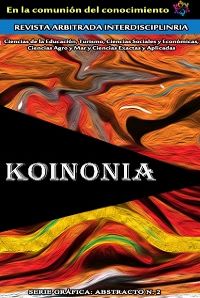Use of social networks by a group of young people with intellectual disabilities
DOI:
https://doi.org/10.35381/r.k.v7i14.1878Keywords:
Learning disabilities, special needs education, inclusive education. (UNESCO Thesaurus).Abstract
The objective is to analyze the relationship between the process of social skills development and the use of social networks by a group of young people with intellectual disabilities of higher cognitive integrity belonging to the Comprehensive Training Center AVEPANE (Venezuelan Association of Parents and Friends of Exceptional Children). We worked methodologically from a qualitative perspective. An important factor of the analysis is that for them all their friends are truly friends; in effect, their known companion is as much a contact as the unknown one, as their teacher or trainer, although in all of us who have a social network it is like that, we emphasize the horizontality not of the network itself, but the fact that they are not inhibited in having contact with someone who can be an authority figure, which is also perceived as positive and interesting (we will also analyze this in the friendship relationships).
Downloads
References
Aramayo, M. & Navas, T. (2013). La lectura para personas con Síndrome de Down y Discapacidad Intelectual [Reading for people with Down Syndrome and Intellectual Disability]. Colección Discapacidad. Caracas: Universidad Monteávila.
Aramayo, M. (2005). La discapacidad. Construcción de un modelo teórico venezolano [Disability. Construction of a Venezuelan theoretical model]. Caracas: Fondo Editorial de la Facultad de Medicina - UCV.
Bruzzo, M; Halperin, E. & Lanci, C. (2010). Integración en la Escuela [School Integration]. Buenos Aires: Circuito Latino Austral S.A. (Grupo CLASA).
Colmenares, M. (2002). Estructura de la Comunicación Humana, el lenguaje y su relación con el conocimiento (Tema 10) [Structure of Human Communication, language and its relation to knowledge (Item 10)]. En Universidad Pontificia Salesiana de Roma, Síntesis General de Filosofía (págs. 48-51). Los Teques – Edo. Miranda: Universidad Pontificia Salesiana de Roma. Sede Filial.
Delgado-Ramírez, J. C., Valarezo-Castro, J. W., Acosta-Yela, M. T., & Samaniego-Ocampo, R. D. L. (2021). Educación Inclusiva y TIC: Tecnologías de Apoyo para Personas con Discapacidad Sensorial [Inclusive Education and ICT: Assistive Technologies for Persons with Sensory Disabilities]. Revista Tecnológica-Educativa Docentes 2.0, 11(1), 146–153. https://doi.org/10.37843/rted.v11i1.204
Díaz, R. (2015). Las Competencias y la Formación Integral: de las Políticas a las Acciones Educativas [Competencies and Integral Education: from Policies to Educational Actions]. Revista Areté, I (1), Recuperado en: http://saber.ucv.ve/ojs/index.php/rev_arete/article/view/9190
González, G. (2002). La dimensión intersubjetiva del hombre: De la egología a la dimensión interpersonal [The intersubjective dimension of man: From egology to the interpersonal dimension]. En Universidad Pontificia Salesiana de Roma, Síntesis General de Filosofía (págs. 6-11). Los Teques - Edo. Miranda: Universidad Pontificia Salesiana de Roma. Sede Filial.
Gutiérrez-Recacha, P., & Martorell-Cafranga, A. (2011). People with intellectual disability and ICTs [Las personas con discapacidad intelectual ante las TIC]. Comunicar, 36, 173-180. https://doi.org/10.3916/C36-2011-03-09
Melaré, D. (2007). Tecnologías de la Inteligencia. Gestión de la Competencia Pedagógica Virtual [Intelligence Technologies. Virtual Pedagogical Competence Management]. Madrid: Editorial Popular.
Naranjo-Sánchez, B. A., & Chávez-Huacón, K. A. (2019). TIC para la inclusión educativa universitaria en la UPS Sede Guayaquil [ICTs for university educational inclusion at UPS Guayaquil Campus]. INNOVA Research Journal, 4(3.1), 55-71. https://doi.org/10.33890/innova.v4.n3.1.2019.975
Puigdellívol, I. (2010). Inclusión, Escuela y Comunidad [Inclusion, School and Community]. En M. Aramayo, Hablemos de Diversidad en la Discapacidad (págs. 21-48). Caracas: I Jornadas de Investigación en Discapacidad. Centro de Estudios de la Discapacidad. Universidad Monteávila.
Published
How to Cite
Issue
Section
License
CC BY-NC-SA : Esta licencia permite a los reutilizadores distribuir, remezclar, adaptar y construir sobre el material en cualquier medio o formato solo con fines no comerciales, y solo siempre y cuando se dé la atribución al creador. Si remezcla, adapta o construye sobre el material, debe licenciar el material modificado bajo términos idénticos.
OAI-PMH URL: https://fundacionkoinonia.com.ve/ojs/index.php/revistakoinonia/oai.









